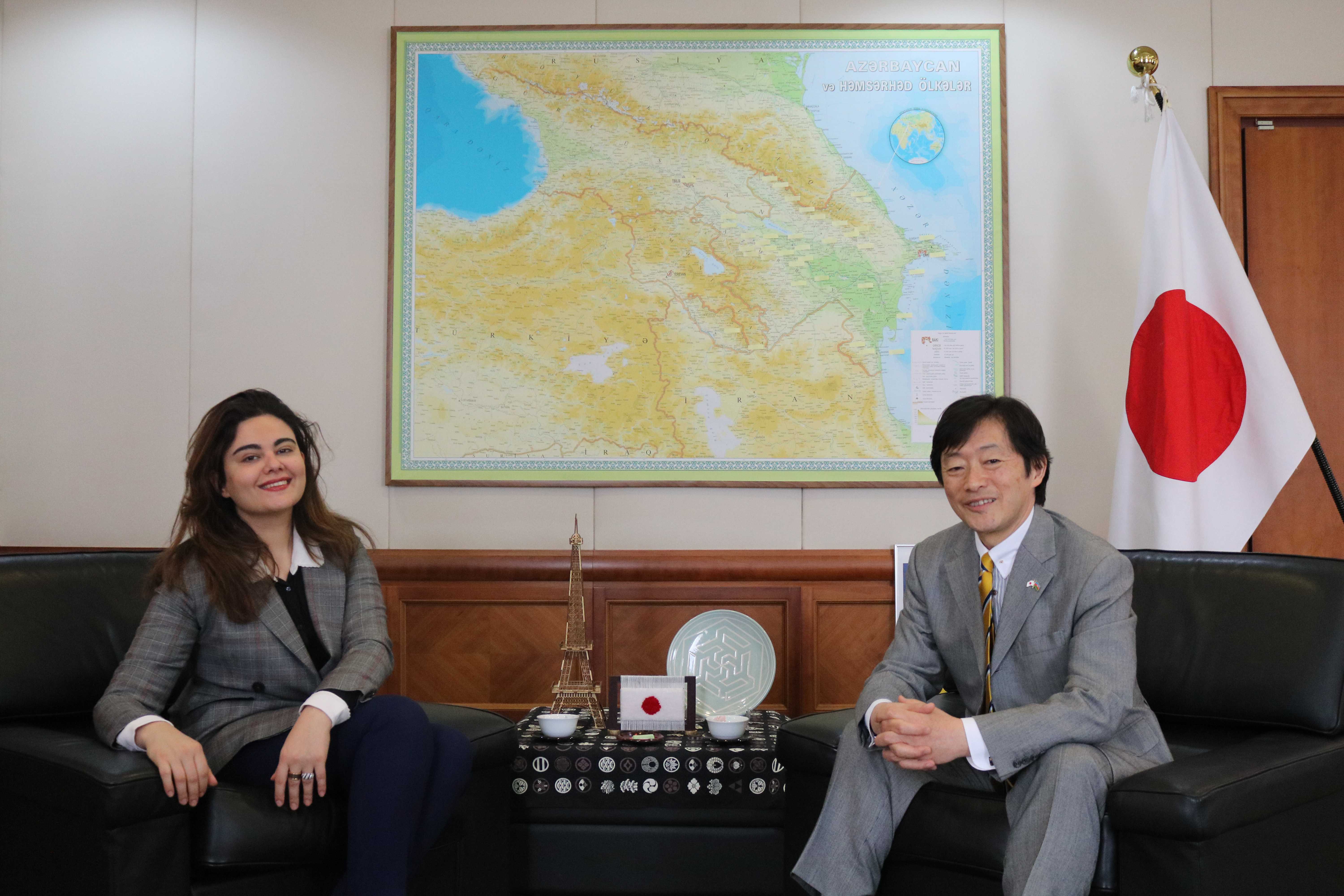Interviews with Francophones presents: Ambassador of Japan in Azerbaijan: "The strength of the French higher education system is that it is internationalized."
2019-04-25

Katori Teruyuki, Japanese Ambassador in Azerbaijan and Nazrin Mirzayeva, UFAZ PR Manager
Before answering the questions, I want to express my heartfelt feelings for the tragedy that happened at the Notre Dame Cathedral. I share with you the hope that this cathedral, cultural heritage of humanity, will be rebuilt as quickly as possible.
Avant de répondre aux questions, j'exprime ma sincère compassion et ma profonde sympathie au peuple français pour la tragédie qui s'est produite à la cathédrale Notre-Dame de Paris. Je partage avec vous l’espoir que la Cathédrale, patrimoine culturel de l'humanité, retrouvera son aspect originel le plus rapidement possible.
1. When did your diplomatic mission start in Baku as an Ambassador to Azerbaijan?
I started my mission as Ambassador of Japan to the Republic of Azerbaijan in March 2016.
2. What is your best memory of working in Azerbaijan?
I was very happy to be appointed ambassador of this fascinating country.
Azerbaijan is located at the crossroads of the East and the West, and its history has created a diverse and rich culture. It is a country where the past and present co-exist - modern, high-rise buildings, historic sites such as the old town of Baku and even older, such as the ancient carvings at Gobustan. Azerbaijan is also blessed with rich nature, and each region has its own distinct flavors and attractions.
3. Do you use the French language during your diplomatic activities and diplomatic career?
This is my first diplomatic posting, having spent the majority of my career working for Japan’s health, labor and welfare ministry. However, I did have the chance to use French in a professional capacity during my previous career. In the 1980s, I worked for three years working as a consultant for the Organization for Economic Co-operation and Development (OECD) in Paris. After that experience, I, unfortunately, have had few opportunities to use French in my work, except for participating in international conferences. That is why it makes me so happy that there are many diplomats from francophone countries, French-speaking diplomats and French language students here. It is a good opportunity to dust off my rusty French after 30 years.
4. What is your relation to the French language and France in general?
As I mentioned, I worked in France when I was young, and, like many who have lived or studied in France, I am fascinated by France and have always valued my relationship with the country. I enjoy French movies, especially those by François Truffaut, Louis Malle, Luc Besson,
Agnès Varda and of course Jean-Luc Godard, and I love the French(i.e. French-speaking) actors and actresses Isabelle Adjani, Eva Green, Juliette Binoche and Jean Reno. I love French music as well, such as that by Serge Gainsbourg, Françoise Hardy, Edith Piaf, and Jacques Brel. And I confess that I am a French wine freak!
Another funny fact about myself is that I still have my driver’s license from my days living in France because the license does not have an expiration date. I am a bit younger in the photo than I am now though.
5. Would you call yourself a francophone and if yes what does it mean and imply for you?
Unfortunately, my French is rusty, and I am working to improve it while I live in Baku. But I don’t think that considering oneself a francophone necessarily has to do with one’s level of language ability. I think being a francophone also means the consumption of media in the French language, such as listening to music or watching films, which I do often.
6. What is your opinion about the Higher education system of France? Its assets and drawbacks? Its strengths?
I think the strength of the French higher education system is that it is internationalized. The French government's consistent policy on the French language means there are many institutions of higher education to teach in French and centers of French culture all over the world. In addition, French universities and graduate schools actively accept many foreign students, and many students from all over the world have the opportunity to study at French universities, such as my niece who studied at Sciences-Po in Le Havre.
7. How did your Higher education in France and your knowledge of French impact/influence your career? Did it also influence in any ways your personal life?
I did not receive any higher education in France. However, my three-year career in France taught me the importance of living and working with people of different cultural backgrounds and different values. Japan, in the far east of Asia, has a different history, different religion, and different cultural background to the Western and Islamic worlds. In France, I always felt accepted. People were curious about my culture in a polite and respectful way. This respect for diversity and other cultures underpins the pillars of democratic institutions and human rights. These are some lessons from France that I hold dear now that I am a diplomat.
8. What is your strongest "French memory" or impression while in France?
There are too many to count!
9. What advice would you give to our students as they are choosing their Master's degree and reflecting on their future?
Azerbaijan is a young country. The future of this country rests on the shoulders of young people like you. Believe in your potential and work hard. Think about the future of your homeland as much as your own future. Be ambitious. Your efforts will always be rewarded.
Thank you.
KATORI, Teruyuki
Ambassador Extraordinary and Plenipotentiary of Japan in the Republic of Azerbaijan



